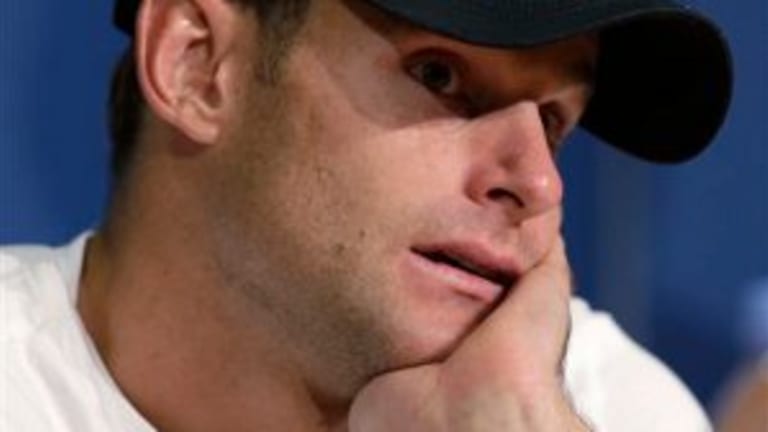Peter Bodo continues his year-end awards—12 in all, for 2012—with the Quotes of the Year. You can see rest of his selections as well as the upcoming awards at the end of this article.
12 for '12: Quotes of the Year
By Peter Bodo Dec 02, 2012Coach's Corner
SPOTTED: Naomi Osaka hits the court with coach Tomasz Wiktorowski in Montreal
By Baseline Staff Jul 29, 2025Pop Culture
Viva la vida! Aryna Sabalenka rocks out at Coldplay concert in Miami
By Baseline Staff Jul 29, 2025Betting Central
Toronto Betting Preview: Arthur Fils vs. Pablo Carreno Busta
By Zachary Cohen Jul 29, 2025Coach's Corner
Alexander Zverev gained inside track of himself as a player from Rafael Nadal during Mallorca visit
By TENNIS.com Jul 29, 2025National Bank Open
Bianca Andreescu pulls out of Montréal, citing torn ligaments in ankle
By David Kane Jul 29, 2025National Bank Open
Holger Rune solves Giovanni Mpetshi Perricard in Toronto opener
By David Kane Jul 29, 2025Ranking Reaction
Carlos Alcaraz kicks off milestone 100th career week inside Top 2 of ATP rankings
By John Berkok Jul 29, 2025US Open
Sinner, Swiatek, Alcaraz, Venus, Djokovic among confirmed US Open mixed doubles competitors
By Matt Fitzgerald Jul 29, 2025ATP Challenger Tour
Marco Trungelliti: An unconventional success story
By Florian Heer Jul 29, 2025Advertising

12 for '12: Quotes of the Year
Men’s: Andy Roddick, after absorbing a dispiriting, 6-2, 6-1 beating at the hands of Novak Djokovic in the second round of the Olympic Games:
“I feel like it’s extremes with me right now. If I win one, it’s like career appreciation day. Then if I lose one, it’s like we should take him out into the field and shoot him in the head.”
This is a great quote on any number of levels. It’s fitting that it comes from the mouth of Roddick, who’s not only always been highly quotable, but who’s also now gone, having retired unexpectedly at the U.S. Open. There have only been a handful of players whose press conferences are so interesting—or amusing—that their peers watch or listen to them. Goran Ivanisevic was one of them. Andre Agassi was one of them. Roddick is another one.
This is a great quote because of its strength. Note Roddick’s juxtaposition of “career appreciation” and “shoot him in the head.” Had Roddick used less colorful, dramatic language for either “extreme,” the quote would not be nearly so memorable.
The relative brevity of the quote, given the territory Roddick is covering, is also classic. A bore is basically someone who tells you everything (in other words, doesn’t know how to edit out the unimportant), and you can’t ever accuse Roddick of being that. Like any good interlocutor, Roddick assumes a certain amount of basic understanding on your part. And he doesn’t feel like he has to tell you the same thing four or five different ways (just check a few of his interview transcripts to see what I mean).
In other words, there are no quotes that are both great and long.
And finally, this quote isn’t just funny, or outlandish, or dramatic. It also contains a fair amount of insight and a hint of the universal within that husk of hyperbole. This year, Roddick was going through what many other players have experienced as either their ability or interest in the game waned. Any retired champion will tell you that at age 30 (Roddick hit the mark just weeks after this loss), you can still play as well and enthusiastically as a 21-year-old. But you can also stink out the joint—come up utterly flat and incapable of stringing together two or three service holds at a time. And the worst thing is that you never know when that big letdown is going to kick in. All you know is that the older you get, the more prone you are to have those bad days.
But the thing that really makes the quote pop is the healthy skepticism it communicates so bluntly about fame and performance. It’s a variant on any number of quotes suggesting that things are never as great as they may appear, nor as bleak. It’s just that the “extremes” are more interesting and eye-catching.
Roddick’s quote isn’t just funny. It also dramatically frames a few truths about the game, and what every player faces as his career winds down.
Honorable Mention: Jim Courier’s advice to John Isner, shortly before Isner went out and recorded one of the great upsets of the year, his Davis Cup victory on red clay in Switzerland over Roger Federer:
“Don't give the artist a canvas to work upon.”
Honorable Mention: Andy Murray is a (video) gamer. He might have been speaking for legions of his peers—most of whom would never be this honest—when he said:
“I haven’t read a book since I was about 14, 15. I got halfway through the third Harry Potter book. It was the first one that was really, really big. It was likes 600 pages. I stopped around 200. I haven’t read a book since then.”
Advertising

12 for '12: Quotes of the Year
Women’s: World No. 1 Victoria Azarenka, upon being told that the WTA was seriously committed to reducing the amount of “grunting” (insert: screaming, shrieking, ululating) on the tour:
“Good luck with that.”
What makes this such a great quote was the insouciant contempt and arrogance. Azarenka is not just a terrific tennis player, she’s also partly responsible for loads of people choosing to change the channel away from tennis, or at least to watch the sport with the “mute” function engaged.
Why wouldn’t the makers of television commercials be thrilled by that habit?
In some ways, the quote (especially under the circumstances in which it was delivered) personifies what has always been the “me first” mentality of so many great players—especially young players, and especially woefully under-educated, uncultured young players to whom the available wealth and fame in tennis can look like so much plunder, there for the taking.
Stop me? Good luck with that!
But let’s also admit that the quote radiates the undistilled spirit of youth, and in an almost comical way. It reminds me of Agassi, early in his career, simply referring to ITF officials as “bozos.” You can envision Azarenka hurrying out of the room, on her way to go beat up on some poor girl on a practice court, as she spoke those words. It’s fun to be young, especially if you’re also successful and in demand.
But that’s not all. The quote addresses one of the bigger—and still growing—controversies in the WTA. This grunting issue is not going away any time soon, and in June the organization said it’s developing a “sport-wide plan” to eliminate excessive grunting through a combination of education and rule changes.
So “Good luck with that. . .” really ought to be, “Just how much time do I have left?”
Honorable Mention: As a provider of great (or at least funny, or mortifying) quotes, grunting just can’t be beaten. Maria Sharapova, a Hall of Fame shrieker herself, was told at the Australian Open that the departed Agnieszka Radwanska had complained to the press about her grunting. To which Sharapova replied,
“Isn’t she back in Poland already?”
Honorable Mention: Serena Williams, when asked if she would be satisfied winning a bronze medal in the Olympic Games:
“Oh, please!”
Serena would win two medals in London, both gold.
Honorable Mention: Indian player Sania Mirza, after the Indian tennis federation paired her up for Olympic mixed doubles with Leander Paes, presumably as an inducement for Paes to compete:
“As an Indian woman belonging to the 21st century, what I find disillusioning is the humiliating manner in which I was put up as a bait to try and pacify one of the disgruntled stalwarts of Indian tennis.”
This might have been my Quote of the Year were it not for the fact that it was not spoken, impromptu, but written in what apparently was a carefully crafted press release. It’s still a powerful, eloquent statement, especially when you take into account the standing of women in India.
12 for '12: Year-End Awards
**- Wednesday, November 28: Coaches of the Year
- Thursday, November 29: Doubles Performances of the Year
- Friday, November 30: Tournaments of the Year
- Saturday, December 1: Upsets of the Year
- Sunday, December 2: Quotes of the Year
- Monday, December 3: Feuds of the Year
- Tuesday, December 4: Newcomers of the Year
- Wednesday, December 5: Most Improved Players
- Thursday, December 6: Biggest Disappointments
- Friday, December 7: Comebacks of the Year
- Saturday, December 8: Runner-Ups of the Year
- Sunday, December 9: Stories of the Year**
**Player of the Year, Men: Novak Djokovic
Player of the Year, Women: Serena Williams**